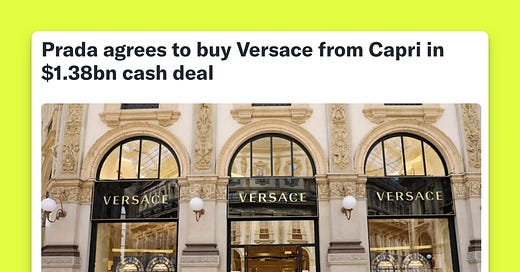Cache Flow #19: Fashion News Roundup
April 5-April 11: This Week in Fashion x Tech x Resale News
In this weekly series, we feature a roundup of the latest news in fashion x tech x resale.
Cache is your personal resale assistant, designed to make resale frictionless, profitable, and sustainable.
Cache automatically scans your purchase receipts from email to surface what you own.
Using AI-driven insights, Cache helps you understand market value and allows users to list items for sale with a single click.
We’re transforming resale from a hassle to a habit. Join our waitlist to experience the future of resale.
Prada has agreed to acquire Versace from Capri Holdings for €1.25 billion ($1.38 billion), bringing the iconic fashion house back under Italian ownership: The deal, expected to close in the latter half of 2025, aims to strengthen Prada's position in the luxury market by adding Versace's bold aesthetic to its portfolio, which includes brands like Miu Miu. Prada plans to maintain Versace's distinct identity while implementing a gradual transformation over 18 to 24 months, focusing on sustainable, long-term growth. Capri Holdings, which acquired Versace in 2018 for $2.1 billion, is selling the brand at a loss amid declining sales and a shift in fashion trends towards "quiet luxury," allowing Capri to refocus on its core Michael Kors brand.
CaaStle, a fashion technology company, is under scrutiny after its CEO, Christine Hunsicker, allegedly misrepresented financial statements and misappropriated $530 million: Despite the board's awareness of these allegations, Hunsicker remained in her position and continued fundraising efforts. Investors were not informed until a March 29 letter, months after the board's discovery. The delayed response has raised significant concerns among stakeholders.
Trump’s tarrifs could lead to thrift store boom: Global tariffs are expected to significantly increase clothing and shoe prices in the U.S., as the nation imports the majority of its apparel from countries like China, Vietnam, and Bangladesh. This anticipated price surge may drive consumers toward thrift stores and secondhand marketplaces to save money. Historically, economic downturns have bolstered the resale industry; for instance, during the Great Recession, nearly two-thirds of U.S. resale stores reported an average sales increase of 31%. Platforms like OfferUp predict heightened activity in secondhand markets, especially in categories heavily impacted by tariffs, as consumers seek affordable alternatives.
Amid trade tensions and economic uncertainty, luxury consumers are shifting away from bold, statement-making pieces in favor of timeless, classic choices that hold long-term value: Brands that had bet on avant-garde collections are adjusting their strategies, refocusing on heritage items and iconic styles. This reflects a broader consumer trend toward investment dressing—favoring purchases that feel safer and more enduring. In times of volatility, luxury is less about flash and more about longevity.
Lyst, a UK-based fashion marketplace, once valued at $700 million, has been acquired by Japan's Zozo for $154 million in cash: Zozo plans to operate Lyst as a standalone business, retaining CEO Emma McFerran. The acquisition reflects challenges in the e-commerce sector, including increased competition and shifting investor focus towards AI technologies.
Have thoughts/opinions/questions on any of the above? Let’s discuss! Join the conversation at the link above.
With love and hot girl energy,
Cache 💚











